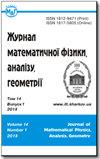量子层析奥布里-马瑟理论
IF 0.4
4区 数学
Q3 MATHEMATICS
引用次数: 1
摘要
本文从层析的角度研究了奥布里-马瑟理论的量子模拟。为了得到一个定义良好的量子相空间实数分布函数,该函数可以作为变分作用最小化问题的解,我们利用反Radon变换对量子马瑟测度进行重构,并证明得到的层析图也是量子马瑟问题的解,并且在半经典意义上收敛于经典马瑟测度。本文章由计算机程序翻译,如有差异,请以英文原文为准。
Quantum tomographic Aubry–Mather theory
In this paper, we study the quantum analog of the Aubry–Mather theory from a tomographic point of view. In order to have a well-defined real distribution function for the quantum phase space, which can be a solution for variational action minimizing problems, we reconstruct quantum Mather measures by means of inverse Radon transform and prove that the resulting tomograms, which are fair and non-negative distribution functions, are also solutions of the quantum Mather problem and, in the semi-classical sense, converge to the classical Mather measures.
求助全文
通过发布文献求助,成功后即可免费获取论文全文。
去求助
来源期刊

Journal of Mathematical Physics Analysis Geometry
PHYSICS, MATHEMATICAL-
CiteScore
0.70
自引率
20.00%
发文量
18
审稿时长
>12 weeks
期刊介绍:
Journal of Mathematical Physics, Analysis, Geometry (JMPAG) publishes original papers and reviews on the main subjects:
mathematical problems of modern physics;
complex analysis and its applications;
asymptotic problems of differential equations;
spectral theory including inverse problems and their applications;
geometry in large and differential geometry;
functional analysis, theory of representations, and operator algebras including ergodic theory.
The Journal aims at a broad readership of actively involved in scientific research and/or teaching at all levels scientists.
 求助内容:
求助内容: 应助结果提醒方式:
应助结果提醒方式:


